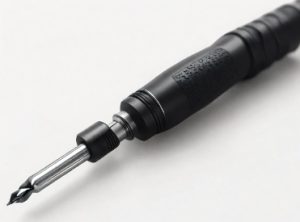Our Location
304 North Cardinal St.
Dorchester Center, MA 02124

Battery-operated screwdrivers have become essential tools for both DIY enthusiasts and professionals. These compact tools offer versatility and convenience, especially in tight spaces where larger drills can’t fit. The growth of the small battery-operated screwdriver market has led to innovations in power, efficiency, and design, catering to different user needs.
Discuss the following features common in high-quality battery-operated screwdrivers:
Bosch is a reputable brand in the power tools industry, known for high-quality and durable products. Their range of battery-operated screwdrivers provides various options for different tasks.
DeWalt offers reliable and high-performance battery-operated screwdrivers, catering to both casual and professional users.
Makita produces a variety of compact, battery-operated screwdrivers with innovative features and durability.
Milwaukee is well-regarded for making robust tools that perform exceptionally well, even in challenging conditions.
Black+Decker offers budget-friendly options that are ideal for home users looking for a reliable small screwdriver for occasional use.
WORX offers unique designs and features that make its battery-operated screwdrivers stand out in the market.
Ryobi provides affordable and efficient power tools, including small battery-operated screwdrivers that cater to both hobbyists and DIY enthusiasts.
Hitachi, now branded as Metabo HPT, produces durable and high-performing small screwdrivers suitable for professional use.
SKIL’s battery-operated screwdrivers are versatile and equipped with features suitable for home improvement projects.
Organize a comparison table that includes features such as voltage, torque settings, battery capacity, charging method, and additional features like LED lighting and adjustable handles.
Small battery-operated screwdrivers are versatile tools with a wide range of applications:
Key considerations when selecting a model include:
The small battery-operated screwdriver market is growing steadily, fueled by consumer demand for convenient, portable, and powerful tools. Recent trends include improvements in battery technology, ergonomic designs, and multifunctionality. These innovations are aimed at providing users with tools that not only perform basic functions but also offer additional features that enhance their usability.
To keep these tools in optimal condition and extend their lifespan, proper maintenance practices are essential. Here are some best practices:
To enhance the functionality of these screwdrivers, many brands offer a range of accessories and attachments. These can be especially beneficial for users who need versatility in their tools.
When selecting a small battery-operated screwdriver, it’s helpful to consider specific needs and typical applications. Below are some recommendations based on user scenarios:
The shift toward lithium-ion batteries in power tools has prompted environmental concerns, particularly regarding disposal and recycling. Manufacturers are actively addressing these concerns through various initiatives:

To make the most of small battery-operated screwdrivers, using the tool effectively can ensure better performance and longer life. Here are some practical tips that can benefit both beginner and seasoned users:
Here’s a concise comparison of leading brands and their respective models based on key features like power, battery life, ergonomics, and value:
| Brand | Model | Power (Voltage) | Battery Life | Special Feature | Price Range |
|---|---|---|---|---|---|
| Bosch | GO 2.0 | 3.6V | Long | Smart motion control | Moderate |
| DeWalt | DCF680N2 | 8V | High | Gyroscopic motion | Premium |
| Black+Decker | BDCSFL20C | 4V | Medium | Pivoting head and flashlight | Budget |
| Milwaukee | M12 2401-20 | 12V | Very High | Compact and high torque | Premium |
| Makita | DF001DW | 3.6V | High | Lightweight and compact design | Moderate |
| WORX | WX255L | 4V | Medium | Semi-automatic bit reloading | Affordable |
| SKIL | SD561801 | 4V | Medium | Dual LED lighting | Budget |
| Metabo HPT | DB3DL2 | 3.6V | High | Dual-position handle | Moderate |
These brands cater to different needs and budgets, making it easier for users to select the model that best suits their specific requirements.
To help you decide if a small battery-operated screwdriver is right for you, here’s an overview of the general advantages and potential limitations of these tools:
Both professionals and DIY enthusiasts can benefit from small battery-operated screwdrivers, but their needs may differ significantly:
The future of battery-operated screwdrivers is likely to include even more integration of advanced technologies, such as artificial intelligence (AI), connectivity, and improved battery performance.
Small battery-operated screwdrivers have evolved significantly, becoming essential tools for both professional and DIY users. With a wide range of options available, from budget-friendly models like Black+Decker BDCSFL20C to high-performance options like the Milwaukee M12 2401-20, these tools offer convenience, efficiency, and precision for countless tasks. As technology advances, features like AI integration, smart connectivity, and even better battery solutions promise to make these tools even more powerful and adaptable.
For those looking to invest in a versatile and portable power tool, a small battery-operated screwdriver is an excellent choice, offering unmatched convenience for everyday tasks and specialized projects alike. With continued innovation, these tools will only become more capable, user-friendly, and indispensable in the toolkit of every homeowner, DIY enthusiast, and professional tradesperson.
